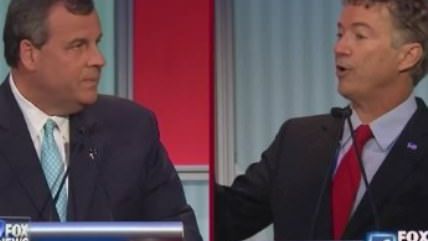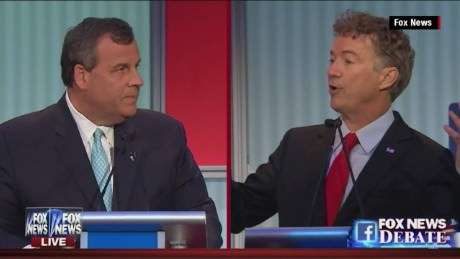Christie, Paul, and the NSA
Fearful, emotional appeals versus the cold light of reality


Debating Chris Christie is a formidable task because he's quick-witted, sharp-tongued and slightly intimidating. Those qualities helped him get the best of Rand Paul in the first Republican presidential debate. But Christie's best weapon is one that may catch up with him: He never lets the truth get in his way.
Earlier this year, Paul led a successful effort to end the National Security Agency's mass collection of Americans' telephone records. During the debate, Christie was asked whether he stands by his assertion that Paul should be blamed if the United States suffers another terrorist attack.
He does, of course: He is not one for second thoughts. Launching into a favorite soliloquy, Christie bragged that he is the only candidate "who has prosecuted and investigated and jailed terrorists after September 11th." He said, "We lost friends of ours in the Trade Center that day. My own wife was two blocks from the Trade Center that day, at her office, having gone through it that morning."
And finally, he declared, "I will make no apologies, ever, for protecting the lives and the safety of the American people. We have to give more tools to our folks to be able to do that, not fewer." He brought to mind Joe Biden's crack that Rudy Giuliani needed only three things to make a sentence: "a noun, a verb and 9/11."
None of Christie's self-dramatization shed any light on the NSA program. But it made him sound like he has a deep understanding of the issue that is pitifully absent in Paul.
When Paul invoked the Fourth Amendment, which forbids unreasonable searches and seizures, and urged the use of search warrants, Christie showered him in contempt. "Listen, senator, you know, when you're sitting in a subcommittee, just blowing hot air about this, you can say things like that," he snorted.
When his rival derided him for allegedly hugging President Barack Obama, Christie once again played the 9/11 card: "The hugs that I remember are the hugs that I gave to the families who lost their people on September 11th." Paul was left smirking lamely. If it had been a boxing match, the referee would have stopped it before he suffered a fatal injury.
But some arguments that look imposing in the heat of battle shrivel up under cold examination. What is clear from Christie's claims about NSA surveillance is that he 1) doesn't know what he's talking about or 2) doesn't care.
The domestic phone records program amassed a vast pile of data that has been very useful in proving the uselessness of vast piles of data. In 2013, U.S. District Judge Richard Leon, appointed by President George W. Bush, found it to be not only unconstitutional, but ineffectual.
"The government," he noted, "does not cite a single instance in which analysis of the NSA's bulk metadata collection actually stopped an imminent attack, or otherwise aided the government in achieving any objective that was time-sensitive in nature."
Obama appointed a panel of experts to assess the NSA program, which Bush started and he continued, and it reached the same conclusion. The information about terrorism it produced, said the group, "was not essential to preventing attacks and could readily have been obtained" through other means.
A study by the New America Foundation, a centrist Washington think tank, agreed: "Surveillance of American phone metadata has had no discernible impact on preventing acts of terrorism." Marshall Erwin, a former Senate Republican staffer who is now a research fellow at the Hoover Institution, has testified, "There does not appear to be a case in which Section 215 bulk phone records played an important role in stopping a terrorist attack."
Paul didn't cite all this evidence in the debate, and even if he had, it might not have blunted the attack. Christie is not the sort to be rattled by the sudden appearance of verified facts. Nor is he trying to attract voters who demand evidence before granting the government more power in the name of fighting terrorism.
He appeals to people who are impressed by a loud voice and an aggressive manner. He appeals to those who think dispassionate analysis is for nerds. He appeals to visceral instincts, which are largely immune to reason.
The message he conveyed is that Paul doesn't know how to stop our enemies because he's had no contact with grim reality. It's an odd charge coming from Christie, whose remedy for terrorism works only in theory.
© Copyright 2015 by Creators Syndicate Inc.


Show Comments (39)